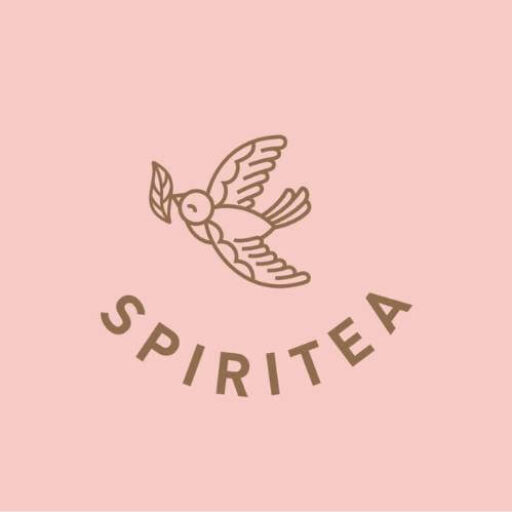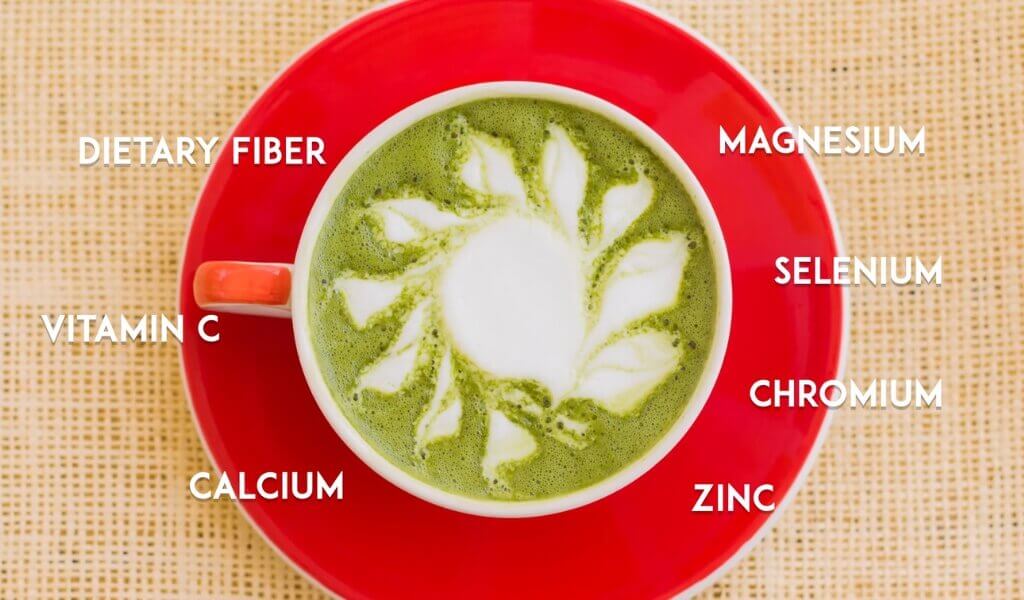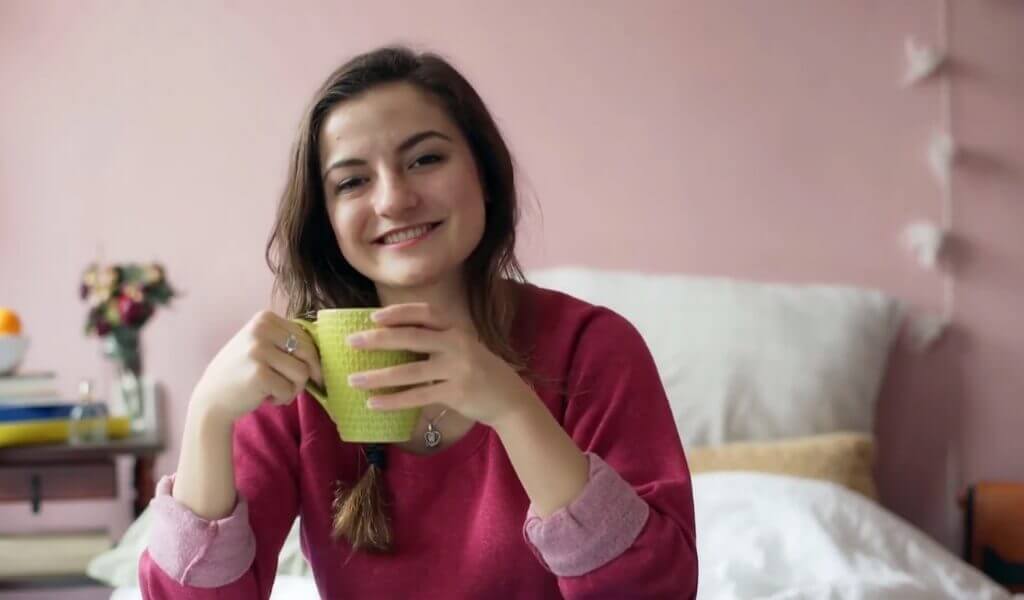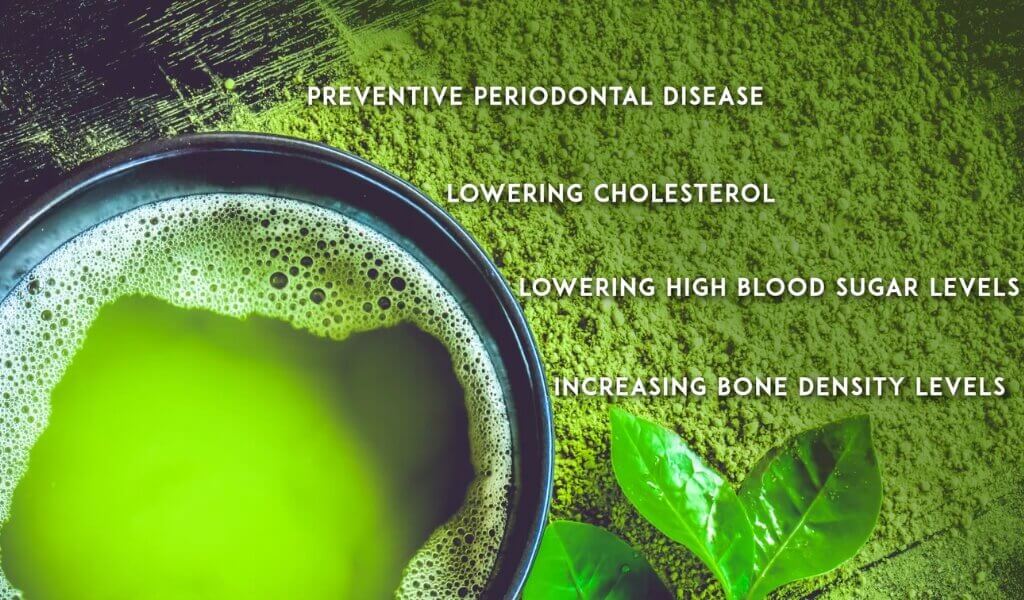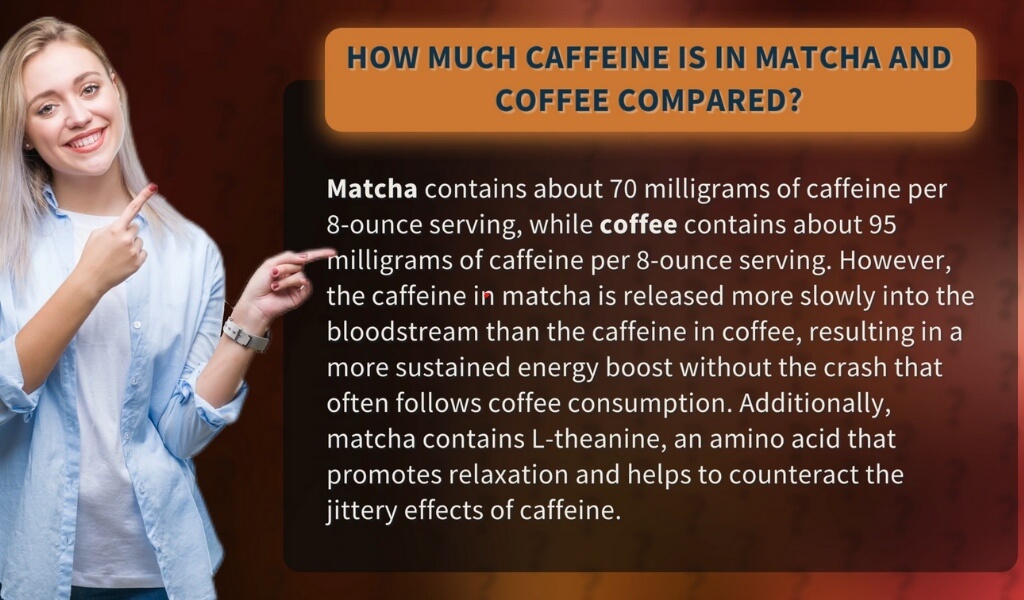Wondering how much caffeine in Matcha? Look no further! In this article, we’ll explore the fascinating realm of matcha, a powdered green tea that has gained popularity for its vibrant color, distinct flavor, and potential health benefits.
Quotes of tea with You
“In 2010, the BBC spent nearly £230,000 on tea, but only £2000 on biscuits.”
― John Lloyd
Does Matcha have caffeine in it?
Yes, matcha does contain caffeine. Although it’s less than most cups of coffee, matcha does contain some caffeine. Compared to a cup of coffee, which has between 100 and 140 mg of caffeine, a cup of matcha typically has just approximately 70 mg. But as you’ll soon discover, matcha can give you a considerably longer period of alertness than coffee does.
You now know matcha contains caffeine, but how much is in that vibrant green powder? Let’s dive deeper.
How much Caffeine in Matcha?
Matcha usually has 19-44 mg of caffeine per gram. A typical serving of matcha is 2-4 grams, which means it contains 38-176 mg of caffeine. In comparison, coffee beans have 10-12 mg of caffeine per gram.
But with such content, is matcha green tea good for you? This can vary depending on the specific type and quality of the matcha and the preparation method.
Unlike coffee, the caffeine in matcha is released gradually, providing a more sustained energy boost without the crash. Matcha also contains L-theanine, an amino acid that promotes relaxation without causing drowsiness. This balance of caffeine and L-theanine in matcha can increase focus and alertness without the jittery feelings sometimes associated with high-caffeine beverages.
Matcha vs green tea caffeine: Main Difference
Different grades of matcha tea can be broadly categorized into two main types: Ceremonial grade and Culinary grade. Let’s take a closer look at these and a few subtypes within the culinary grade.
| Ceremonial Grade Matcha |
This is the highest quality matcha, made from the youngest tea leaves with the stems and veins entirely removed. The leaves are stone-ground into a fine powder.
|
| Culinary Grade Matcha |
This type of matcha is slightly lower in quality and intended for cooking and baking. It’s still high-quality tea but often made from older leaves. This category can be further broken down into
|
| Premium Grade |
This high-quality culinary matcha is suitable for daily consumption.
|
| Café Grade |
This grade is ideal for the best matcha recipe with a strong matcha flavor, like lattes and smoothies.
|
| Kitchen Grade |
This is the most affordable matcha, suitable for cooking and baking.
|
The caffeine content in each type can vary based on factors such as the age of the leaves and how much of the leaf is included in the final product (older leaves and leaves with more stems and veins generally have more caffeine). Here’s a rough estimate:
| Type of Matcha Estimated Caffeine Content (mg per serving) | |
| Ceremonial Grade | 34 – 68 |
| Premium Grade | 32 – 64 |
| Café Grade | 35 – 70 |
| Kitchen Grade | 38 – 76 |
The differences in caffeine content can be attributed to the part of the tea leaf used, the age of the leaves, and the processing method. For example, ceremonial-grade matcha, made from younger tea leaves, typically has less caffeine than kitchen-grade matcha, which includes older tea leaves and often some stems and veins.
However, the differences are usually small, and the general health benefits of matcha remain across all grades.
How much Caffeine in Matcha vs Coffee?
Matcha contains about 70 milligrams of caffeine per 8-ounce serving, while coffee contains about 95 milligrams of caffeine per 8-ounce serving. However, the caffeine in matcha is released more slowly into the bloodstream than the caffeine in coffee, resulting in a more sustained energy boost without the crash that often follows coffee consumption.
Additionally, matcha contains L-theanine, an amino acid that promotes relaxation and helps to counteract the jittery effects of caffeine.
At first glance, coffee is the clear winner, but there’s more to this caffeine story. It’s not just about how much caffeine a beverage contains but how our bodies process it. This is where Matcha types come into their own despite their lower caffeine content.Caffeine in matcha is absorbed and released gradually over several hours, as opposed to caffeine in coffee, which is absorbed fast. This difference is mostly due to L-theanine, an amino acid found in matcha that mitigates the effects of caffeine. So, whereas coffee delivers a rapid kick, matcha provides sustained energy.
This gradual release of energy from matcha prevents the ‘caffeine crash’ you might experience after the initial energy boost from coffee wears off and helps induce relaxed alertness. No wonder Zen Buddhist monks have used matcha for centuries for meditation!FG
Read More:
- Check out the article: what does matcha tea taste like?
- Best Time to Drink Matcha Tea for Weight Loss
Caffeine in Matcha tea vs Other tea
Now you’re asking, “How does the caffeine in my matcha compare to other teas I’ve enjoyed?” Let’s unpack this together.
Here’s a handy comparison table showing the average caffeine content in various types of tea.
| Type of Tea |
Average Caffeine Content (mg per 8 oz cup)
|
| Matcha | 35-70 |
| Black Tea | 40-70 |
| Oolong Tea | 30-50 |
| Green Tea | 20-45 |
| White Tea | 15-30 |
As you can see, matcha tends to have more caffeine than most other teas. Wondering about matcha caffeine vs black tea? It often contains nearly as much as black tea, substantially more than green, oolong, or white tea. I found this interesting given my initial perception of matcha as just another type of green tea.
What affects the Caffeine content of Matcha?
After a bit of research and many cups of matcha later, I’ve learned that several factors come into play.
The first factor is the age of the tea leaves. Younger leaves, usually found at the top of the tea plant, tend to have less caffeine than the older, larger leaves that grow lower. High-quality ceremonial-grade matcha is typically made from these tender, young leaves, whereas culinary-grade matcha often contains older leaves, leading to a higher caffeine content.
The second factor is the shade-growing process. About three weeks before harvest, the best matcha tea plants are shaded to boost their chlorophyll levels, which gives matcha its vibrant green color. This process also increases the plant’s caffeine content. So, the more shading, the higher the caffeine.
Another factor is the processing of the leaves. Unlike regular green tea, where the leaves are steeped and then discarded, matcha is made by grinding the whole tea leaf into a fine powder. When you drink matcha, you’re consuming the entire leaf— and all its caffeine.
Lastly, the preparation of the matcha can also affect its caffeine content. The more matcha powder you use and the longer you whisk it, the more caffeine your cup of matcha will have.
How much caffeine is too much?
Caffeine affects people differently, and the safe amount can vary widely from person to person. However, according to the US Food and Drug Administration (FDA), a general guideline for most adults is that up to 400 milligrams of caffeine daily appears safe. This is roughly the amount of caffeine in four standard cups of brewed coffee, 10 cans of cola, or two “energy shot” drinks.
The bottom line
Matcha, with its unique combination of caffeine and L-theanine, provides a balanced, continuous energy boost without the jitters associated with other caffeinated beverages.
I hope you found my investigation as interesting as I did. If you find this post useful, please share it with other tea and caffeine lovers. Thank you for reading, and enjoy your next cup of matcha!
Thanks for Spiritea Drinks
FAQs
How long does matcha caffeine last?
The caffeine in matcha typically lasts for 3 to 6 hours, thanks to an amino acid called L-theanine which slows the release of caffeine into the bloodstream.
How long does matcha keep you awake?
Matcha can alert you for about 3 to 6 hours due to its unique combination of caffeine and L-theanine. However, it doesn’t typically lead to sleeplessness or jitters like coffee. Everyone is different, so timing and quantity should be adjusted to your personal tolerance.
Does matcha keep you awake at night?
Generally, matcha does not keep you awake at night if consumed in moderation and earlier in the day. Unlike coffee, the caffeine in matcha is released slowly, providing gentle alertness.However, individual sensitivities to caffeine vary, so it’s advisable to adjust your matcha consumption based on personal experience.
Does Starbucks matcha have caffeine?
Yes, Starbucks matcha does contain caffeine. Starbucks uses a blend of sugar, matcha tea blend, and ground Japanese green tea leaves for their matcha drinks, which results in a moderate caffeine content. However, the amount of caffeine can vary depending on the specific beverage and size.
Is matcha caffeinated better than coffee for anxiety?
Matcha can be a better choice than coffee for those with anxiety, primarily due to the amino acid L-theanine. L-theanine promotes relaxation without drowsiness and helps moderate the stimulating effects of caffeine, potentially reducing the jitters and anxiety associated with high caffeine consumption.
How much caffeine in a teaspoon of matcha?
The amount of caffeine in one teaspoon, or two servings, of Kenko Matcha Tea is 68 mg. A cup of coffee, in contrast, contains up to 100 milligrams of caffeine. But when it comes to matcha, more isn’t necessarily better.
Can I replace my morning coffee with matcha?
You can replace your morning coffee with matcha. Many people find that the caffeine in matcha provides a gentler, longer-lasting energy boost without the jitteriness or crash often associated with coffee.
Is the caffeine in matcha safe for pregnant women?
Moderate amounts of caffeine from matcha are typically safe for pregnant women, but it’s always best to consult your healthcare provider. The American College of Obstetricians and Gynecologists advises pregnant women to limit their caffeine intake to less than 200mg per day.
Can Matcha help me quit coffee?
Yes, if you’re trying to cut back on coffee, matcha may be a terrific substitute. Matcha gives a balanced energy boost that can help smooth the move away from coffee due to its unique blend of caffeine for alertness and L-theanine for relaxation.
What kind of matcha has the most caffeine?
The strongest tea on the market, ACTA matcha energy tea has more than double the caffeine of conventional matcha. However, the exact amount can vary depending on the specific brand and preparation method.
How does the caffeine in matcha interact with L-theanine?
The caffeine in matcha works synergistically with the amino acid L-theanine to provide a sustained energy boost. L-theanine helps slow the release of caffeine, leading to a longer-lasting, more balanced stimulation without the jitters or crashes often associated with other caffeinated drinks.
How does the shading process affect caffeine levels in matcha?
The shading process used in matcha production increases the plant’s chlorophyll content, which enhances its vibrant green color. This process also boosts the caffeine levels in the tea leaves, resulting in a higher caffeine content in the final product.
Can I use matcha as a pre-workout supplement?
Yes, matcha can be an effective pre-workout supplement due to its natural caffeine content and the presence of L-theanine, which provides a balanced and prolonged energy boost. However, as with any supplement, it’s best to consult your healthcare provider or a fitness professional.
I’m Shanna, creator of Spiritea Drinks. I’m all about teaching people to grow their own food, tea, cook what they harvest, and eat with the seasons.
